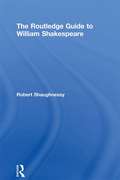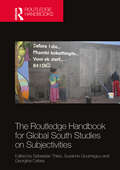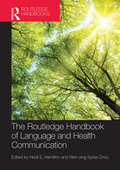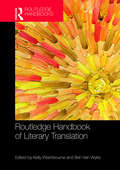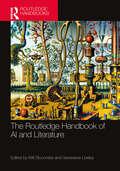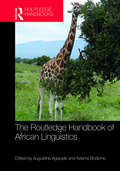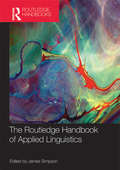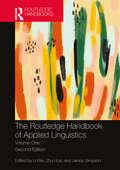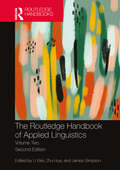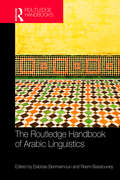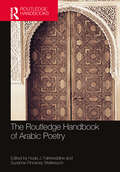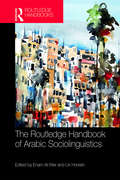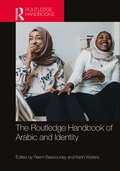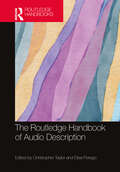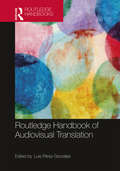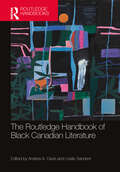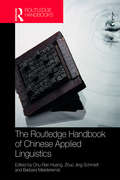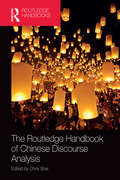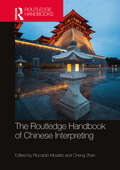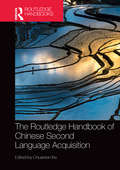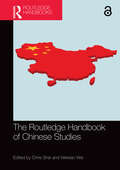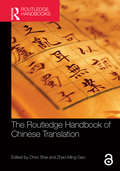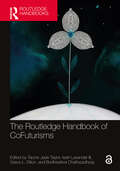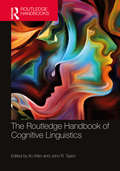- Table View
- List View
The Routledge Guide to William Shakespeare
by Robert ShaughnessyDemystifying and contextualising Shakespeare for the twenty-first century, this book offers both an introduction to the subject for beginners as well as an invaluable resource for more experienced Shakespeareans. In this friendly, structured guide, Robert Shaughnessy: introduces Shakespeare’s life and works in context, providing crucial historical background looks at each of Shakespeare’s plays in turn, considering issues of historical context, contemporary criticism and performance history provides detailed discussion of twentieth-century Shakespearean criticism, exploring the theories, debates and discoveries that shape our understanding of Shakespeare today looks at contemporary performances of Shakespeare on stage and screen provides further critical reading by play outlines detailed chronologies of Shakespeare’s life and works and also of twentieth-century criticism The companion website at www.routledge.com/textbooks/shaughnessy contains student-focused materials and resources, including an interactive timeline and annotated weblinks.
The Routledge Handbook for Global South Studies on Subjectivities (Transdisciplinary Souths)
by Sebastian Thies Susanne Goumegou Georgina CebeyThe Routledge Handbook for Global South Studies on Subjectivities provides a series of exemplary studies conjoining perspectives from Asian, African, and Latin American Studies on subjectivity in the Global South as a central category of social and cultural analysis. The contestation of the Northern myth of the autonomous subject—the dispositive that contests subject formation in the South by describing it as fragmented, incomplete, delayed or simply deviant, has been a cornerstone of theory production from the South over the years.This volume’s contributions offer an interdisciplinary and transarea dialogue, reframing issues of selfhood and alterity, of personhood, of the human, of the commons and contesting the North’s presumption in determining what kind of subjectivities abide by its norms, whose voices are heard, who is recognised as a subject, and, by extension, whose lives matter. In the context of the shifting dynamics of today’s manifold crises, they raise questions regarding how subjectivities act on or resist such forms of contestation, contingency, and indeterminacy.A major contribution to the growing body of scholarship on the Global South, this handbook will be an essential resource for students, scholars, researchers and instructors in literature, media and culture studies, sociology, anthropology, philosophy, law, politics, visual arts and art history.
The Routledge Handbook of Language and Health Communication (Routledge Handbooks in Applied Linguistics)
by Heidi Hamilton Wen-ying Sylvia ChouThe Routledge Handbook of Language and Health Communication consists of forty chapters that provide a broad, comprehensive, and systematic overview of the role that linguistics plays within health communication research and its applications. The Handbook is divided into three sections: Individuals’ everyday health communication Health professionals’ communicative practices Patient-provider communication in interaction Special attention is given to cross-cutting themes, including the role of technology in health communication, narrative, and observations of authentic, naturally-occurring contexts. The chapters are written by international authorities representing a wide range of perspectives and approaches. Building on established work with cutting-edge studies on the changing health communication landscape, this volume will be an essential reference for all those involved in health communication and applied linguistics research and practice.
The Routledge Handbook of Literary Translation (Routledge Handbooks in Translation and Interpreting Studies)
by Kelly Washbourne Ben Van WykeThe Routledge Handbook of Literary Translation provides an accessible, diverse and extensive overview of literary translation today. This next-generation volume brings together principles, case studies, precepts, histories and process knowledge from practitioners in sixteen different countries. Divided into four parts, the book covers many of literary translation’s most pressing concerns today, from teaching, to theorising, to translation techniques, to new tools and resources. Featuring genre studies, in which graphic novels, crime fiction, and ethnopoetry have pride of place alongside classics and sacred texts, The Routledge Handbook of Literary Translation represents a vital resource for students and researchers of both translation studies and comparative literature.
The Routledge Handbook of AI and Literature (Routledge Literature Handbooks)
by Genevieve Liveley Will SlocombeThe Routledge Handbook of AI and Literature provides an invaluable resource for those interested in deepening their understanding of the variety of theories and approaches available when AI is studied or deployed in literary contexts. It also illustrates ways in which AI researchers can use literary lenses to better understand the sociotechnical dynamics and cultural imaginaries shaping human interactions with AI.Both AI and literature are understood in their broadest senses here. The book incorporates chapters that deal with Large Language Models, Generative AI, transformer architectures, story generators, and computational analysis. Literary case studies embrace performance, poetry, comics, as well as prose, and span a wide range of historical periods, from the ancient world to contemporary science fiction and Generative AI poetry.The Handbook brings together early career contributors, as well as some of the best-known names in the digital humanities and computational literary studies. It offers a fresh perspective on the past, present, and future of AI and literature that will appeal to students and scholars with relevant interests across a range of subjects, including AI Engineering, Classics, Computing, Digital Humanities, English, Ethics, Film and Television, Law, and Narratology.
The Routledge Handbook of African Linguistics (Routledge Language Handbooks)
by Augustine Agwuele Adams BodomoThe Handbook of African Linguistics provides a holistic coverage of the key themes, subfields, approaches and practical application to the vast areas subsumable under African linguistics that will serve researchers working across the wide continuum in the field. Established and emerging scholars of African languages who are active and current in their fields are brought together, each making use of data from a linguistic group in Africa to explicate a chosen theme within their area of expertise, and illustrate the practice of the discipline in the continent.
The Routledge Handbook of Applied Linguistics (Routledge Handbooks in Applied Linguistics)
by James SimpsonThe Routledge Handbook of Applied Linguistics serves as an introduction and reference point to key areas in the field of applied linguistics. The five sections of the volume encompass a wide range of topics from a variety of perspectives: applied linguistics in action language learning, language education language, culture and identity perspectives on language in use descriptions of language for applied linguistics. The forty-seven chapters connect knowledge about language to decision-making in the real world. The volume as a whole highlights the role of applied linguistics, which is to make insights drawn from language study relevant to such decision-making. The chapters are written by specialists from around the world. Each one provides an overview of the history of the topic, the main current issues and possible future trajectory. Where appropriate, authors discuss the impact and use of new technology in the area. Suggestions for further reading are provided with every chapter. The Routledge Handbook of Applied Linguistics is an essential purchase for postgraduate students of applied linguistics. Editorial board: Ronald Carter, Guy Cook, Diane Larsen-Freeman and Amy Tsui.
The Routledge Handbook of Applied Linguistics (Routledge Handbooks in Applied Linguistics)
by James Simpson Li Wei Zhu HuaThe Routledge Handbook of Applied Linguistics, published in 2011, has long been a standard introduction and essential reference point to the broad interdisciplinary field of applied linguistics. Reflecting the growth and widening scope of applied linguistics, this new edition thoroughly updates and expands coverage. It includes 27 new chapters, now consists of two complementary volumes, and covers a wide range of topics from a variety of perspectives. Volume One is organized into two sections – 'Language learning and language education' and 'Key areas and approaches in applied linguistics – and Volume Two also two sections – 'Applied linguistics in society' and 'Broadening horizons'. Each volume includes 30 chapters written by specialists from around the world. Each chapter provides an overview of the history of the topic, the main current issues, recommendations for practice, and possible future trajectories. Where appropriate, authors discuss the impact and use of new research methods in the area. Suggestions for further reading and cross-references are provided with every chapter. The Routledge Handbook of Applied Linguistics remains the authoritative overview of this dynamic field and essential reading for advanced undergraduate and postgraduate students, scholars, and researchers of applied linguistics.
The Routledge Handbook of Applied Linguistics (Routledge Handbooks in Applied Linguistics)
by James Simpson Li Wei Zhu HuaThe Routledge Handbook of Applied Linguistics, published in 2011, has long been a standard introduction and essential reference point to the broad interdisciplinary field of applied linguistics. Reflecting the growth and widening scope of applied linguistics, this new edition thoroughly updates and expands coverage. It includes 27 new chapters, now consists of two complementary volumes, and covers a wide range of topics from a variety of perspectives. Volume One is organized into two sections – ‘Language learning and language education’ and ‘Key areas and approaches in applied linguistics’ – and Volume Two also has two sections – ‘Applied linguistics in society’ and ‘Broadening horizons’. Each volume includes 30 chapters written by specialists from around the world. Each chapter provides an overview of the history of the topic, the main current issues, recommendations for practice, and possible future trajectories. Where appropriate, authors discuss the impact and use of new research methods in the area. Suggestions for further reading and cross-references are provided with every chapter. The Routledge Handbook of Applied Linguistics remains the authoritative overview to this dynamic field and essential reading for advanced undergraduate and postgraduate students, scholars, and researchers of applied linguistics.
The Routledge Handbook of Arabic Linguistics (Routledge Language Handbooks)
by Elabbas Benmamoun Reem BassiouneyThe Routledge Handbook of Arabic Linguistics introduces readers to the major facets of research on Arabic and of the linguistic situation in the Arabic-speaking world. The edited collection includes chapters from prominent experts on various fields of Arabic linguistics. The contributors provide overviews of the state of the art in their field and specifically focus on ideas and issues. Not simply an overview of the field, this handbook explores subjects in great depth and from multiple perspectives. In addition to the traditional areas of Arabic linguistics, the handbook covers computational approaches to Arabic, Arabic in the diaspora, neurolinguistic approaches to Arabic, and Arabic as a global language. The Routledge Handbook of Arabic Linguistics is a much-needed resource for researchers on Arabic and comparative linguistics, syntax, morphology, computational linguistics, psycholinguistics, sociolinguistics, and applied linguistics, and also for undergraduate and graduate students studying Arabic or linguistics.
The Routledge Handbook of Arabic Poetry (Routledge Literature Handbooks)
by Huda Fakhreddine Suzanne Pinckney StetkevychComprised of contributions from leading international scholars, The Routledge Handbook of Arabic Poetry incorporates political, cultural, and theoretical paradigms that help place poetic projects in their socio-political contexts as well as illuminate connections across the continuum of the Arabic tradition. This volume grounds itself in the present moment and, from it, examines the transformations of the fifteen-century Arabic poetic tradition through readings, re-readings, translations, reformulations, and co-optations. Furthermore, this collection aims to deconstruct the artificial modern/pre-modern divide and to present the Arabic poetic practice as live and urgent, shaped by the experiences and challenges of the twenty-first century and at the same time in constant conversation with its long tradition. The Routledge Handbook of Arabic Poetry actively seeks to destabilize binaries such as that of East-West in contributions that shed light on the interactions of the Arabic tradition with other Middle Eastern traditions, such as Persian, Turkish, and Hebrew, and on South-South ideological and poetic networks of solidarity that have informed poetic currents across the modern Middle East. This volume will be ideal for scholars and students of Arabic, Middle Eastern, and comparative literature, as well as non-specialists interested in poetry and in the present moment of the study of Arabic poetry.
The Routledge Handbook of Arabic Sociolinguistics
by Enam Al-Wer Uri HoreshThe Routledge Handbook of Arabic Sociolinguistics comprises 22 chapters encompassing various aspects in the study of Arabic dialects within their sociolinguistic context. This is a novel volume, which not only includes the traditional topics in variationist sociolinguistics, but also links the sociolinguistic enterprise to the history of Arabic and to applications of sociolinguistics beyond the theoretical treatment of variation. Newly formed trends, with an eye to future research, form the backbone of this volume. With contributions from an international pool of researchers, this volume will be of interest to scholars and students of Arabic sociolinguistics, as well as to linguists interested in a concise, rounded view of the field.
The Routledge Handbook of Arabic and Identity
by Keith Walters Reem BassiouneyThe Routledge Handbook of Arabic and Identity offers a comprehensive and up-to-date account of studies that relate the Arabic language in its entirety to identity. This handbook offers new trajectories in understanding language and identity more generally and Arabic and identity in particular. Split into three parts, covering ‘Identity and Variation’, ‘Identity and Politics’ and ‘Identity Globalisation and Diversity’, it is the first of its kind to offer such a perspective on identity, linking the social world to identity construction and including issues pertaining to our current political and social context, including Arabic in the diaspora, Arabic as a minority language, pidgin and creoles, Arabic in the global age, Arabic and new media, Arabic and political discourse. Scholars and students will find essential theories and methods that relate language to identity in this handbook. It is particularly of interest to scholars and students whose work is related to the Arab world, political science, modern political thought, Islam and social sciences including: general linguistics, sociolinguistics, discourse analysis, anthropological linguistics, anthropology, political science, sociology, psychology, literature media studies and Islamic studies.
The Routledge Handbook of Audio Description (Routledge Handbooks in Translation and Interpreting Studies)
by Christopher Taylor Elisa PeregoThis Handbook provides a comprehensive overview of the expanding field of audio description, the practice of rendering the visual elements of a multimodal product such as a film, painting, or live performance in the spoken mode, for the benefit principally of the blind and visually impaired community. This volume brings together scholars, researchers, practitioners and service providers, such as broadcasters from all over the world, to cover as thoroughly as possible all the theoretical and practical aspects of this discipline. In 38 chapters, the expert authors chart how the discipline has become established both as an important professional service and as a valid academic subject, how it has evolved and how it has come to play such an important role in media accessibility. From the early history of the subject through to the challenges represented by ever-changing technology, the Handbook covers the approaches and methodologies adopted to analyse the “multimodal” text in the constant search for the optimum selection of the elements to describe. This is the essential guide and companion for advanced students, researchers and audio description professionals within the more general spheres of translation studies and media accessibility.
The Routledge Handbook of Audiovisual Translation (Routledge Handbooks in Translation and Interpreting Studies)
by Luis Pérez-GonzálezThe Routledge Handbook of Audiovisual Translation provides an accessible, authoritative and comprehensive overview of the key modalities of audiovisual translation and the main theoretical frameworks, research methods and themes that are driving research in this rapidly developing field. Divided in four parts, this reference work consists of 32 state-of-the-art chapters from leading international scholars. The first part focuses on established and emerging audiovisual translation modalities, explores the changing contexts in which they have been and continue to be used, and examines how cultural and technological changes are directing their future trajectories. The second part delves into the interface between audiovisual translation and a range of theoretical models that have proved particularly productive in steering research in audiovisual translation studies. The third part surveys a selection of methodological approaches supporting traditional and innovative ways of interrogating audiovisual translation data. The final part addresses an array of themes pertaining to the place of audiovisual translation in society. This Handbook gives audiovisual translation studies the platform it needs to raise its profile within the Humanities research landscape and is key reading for all those engaged in the study and research of Audiovisual Translation within Translation studies.
The Routledge Handbook of Black Canadian Literature (Routledge Literature Handbooks)
by Andrea A. Davis Leslie SandersThe Routledge Handbook of Black Canadian Literature offers a comprehensive overview of the growing and increasingly significant field of Black Canadian literary studies. Including historical and contemporary analysis, this volume is an essential text that maps the field over the almost 200 years of its existence across a range of genres from slave narratives to prose fiction, poetry, theatre, and dub and spoken word. It presents Black Canadian literature as encompassing a diverse set of viewpoints, approaches, and practices, touching every aspect of Canadian territory and life, and as deeply influencing debates and understandings of Black peoples far beyond its borders. This Handbook employs an interdisciplinary framework that incorporates literary, historical, geographical, and cultural analysis. This book comprising 32 chapters is organized into five sections that chart the literature’s development into a recognizable canon, trace Black literary geographies across Canada from east to west, delineate the literature’s various genres and expressive forms, and honor the writers and thinkers who have influenced the growth of the field. This volume’s range of subject and plurality of perspectives provide an excellent resource for teachers, researchers, and students from multiple disciplines, including Canadian studies and literature, Caribbean studies, global Black studies, hemispheric studies, diaspora studies, history, and cultural studies.
The Routledge Handbook of Chinese Applied Linguistics
by Barbara Meisterernst Chu-Ren Huang Zhuo Jing-SchmidtThe Routledge Handbook of Chinese Applied Linguistics is written for those wanting to acquire comprehensive knowledge of China, the diaspora and the Sino-sphere communities through Chinese language. It examines how Chinese language is used in different contexts, and how the use of Chinese language affects culture, society, expression of self and persuasion of others; as well as how neurophysiological aspects of language disorder affect how we function and how the advance of technology changes the way the Chinese language is used and perceived. The Handbook concentrates on the cultural, societal and communicative characteristics of the Chinese language environment. Focusing on language use in action, in context and in vivo, this book intends to lay empirical grounds for collaboration and synergy among different fields.
The Routledge Handbook of Chinese Discourse Analysis
by Chris SheiChinese is a discourse-oriented language and the underlying mechanisms of the language involve encoding and decoding so the language can be correctly delivered and understood. To date, there has been a lack of consolidation at the discourse level such that a reference framework for understanding the language in a top-down fashion is still underdeveloped. The Routledge Handbook of Chinese Discourse Analysis is the first to showcase the latest research in the field of Chinese discourse analysis to consolidate existing findings, put the language in both theoretical and socio-functional perspectives, offer guidance and insights for further research and inspire innovative ideas for exploring the Chinese language in the discourse domain. The book is aimed at both students and scholars researching in the areas of Chinese linguistics and discourse analysis.
The Routledge Handbook of Chinese Interpreting (Routledge Handbooks in Translation and Interpreting Studies)
by Riccardo Moratto Cheng ZhanThis Handbook sheds light on the current trends in interpretation research, with a particular focus on China and Chinese interpreting.Over the years, the field of Chinese interpreting has experienced remarkable growth, not only in terms of market demand but also in research trends within the discipline of translation studies. In China, specifically, interpretation studies have been at the forefront of developments in pioneering new approaches and methodologies. The chapters in this Handbook delve into various aspects of interpretation research, encompassing both theoretical frameworks and practical applications. From examining the intricacies of consecutive and simultaneous interpretation to exploring the role of technology in shaping the future of the profession, the contributors offer valuable insights into the advancements and challenges within Chinese interpreting. By showcasing the latest research trends and sharing valuable experiences from renowned scholars and practitioners, this collection contributes to the ongoing dialogue surrounding interpretation studies.This Handbook is a comprehensive resource for academics, researchers, students, and professionals seeking to deepen their understanding of Chinese interpreting and its evolving landscape.
The Routledge Handbook of Chinese Second Language Acquisition (Routledge Language Handbooks)
by Chuanren KeThe Routledge Handbook of Chinese Second Language Acquisition is the first reference work of its kind. The handbook contains twenty contributions from leading experts in the field of Chinese SLA, covering a wide range of topics such as social contexts, linguistic perspectives, skill learning, individual differences and learning settings and testing. Each chapter covers historical perspectives, core issues and key findings, research approaches, pedagogical implications, future research direction and additional references. The Routledge Handbook of Chinese Second Language Acquisition is an essential reference for Chinese language teachers and researchers in Chinese applied linguistics and second language acquisition.
The Routledge Handbook of Chinese Studies
by Chris Shei and Weixiao WeiThis Handbook approaches Chinese Studies from an interdisciplinary perspective while attempting to establish a fundamental set of core values and tenets for the subject, in relation to the further development of Chinese Studies as an academic discipline. It aims to consolidate the current findings in Chinese Studies, extract the essence from each affiliated discipline, formulate a concrete set of ideas to represent the ‘Chineseness’ of the subject, establish a clear identity for the discipline and provide clear guidelines for further research and practice. Topics included in this Handbook cover a wide spectrum of traditional and newly added concerns in Chinese Studies, ranging from the Chinese political system and domestic governance to international relations, Chinese culture, literature and history, Chinese sociology (gender, middle class, nationalism, home ownership, dating) and Chinese opposition and activism. The Handbook also looks at widening the scope of Chinese Studies (Chinese psychology, postcolonialism and China, Chinese science and climate change), and some illustrations of innovative Chinese Studies research methods. The Routledge Handbook of Chinese Studies is an essential reference for researchers and scholars in Chinese Studies, as well as students in the discipline.
The Routledge Handbook of Chinese Translation (Routledge Language Handbooks)
by Chris Shei Zhao-Ming GaoThe Routledge Handbook of Chinese Translation presents expert and new research in analysing and solving translation problems centred on the Chinese language in translation. The Handbook includes both a review of and a distinctive approach to key themes in Chinese translation, such as translatability and equivalence, extraction of collocation, and translation from parallel and comparable corpora. In doing so, it undertakes to synthesise existing knowledge in Chinese translation, develops new frameworks for analysing Chinese translation problems, and explains translation theory appropriate to the Chinese context. The Routledge Handbook of Chinese Translation is an essential reference work for advanced undergraduate and postgraduate students and scholars actively researching in this area.
The Routledge Handbook of CoFuturisms (Routledge Literature Handbooks)
by Bodhisattva Chattopadhyay Grace L. Dillon Isiah Lavender III Taryne Jade TaylorThe Routledge Handbook of CoFuturisms delivers a new, inclusive examination of science fiction, from close analyses of single texts to large-scale movements, providing readers with decolonized models of the future, including print, media, race, gender, and social justice. This comprehensive overview of the field explores representations of possible futures arising from non-Western cultures and ethnic histories that disrupt the “imperial gaze”. In four parts, The Routledge Handbook of CoFuturisms considers the look of futures from the margins, foregrounding the issues of Indigenous groups, racial, ethnic, religious, and sexual minorities, and any people whose stakes in the global order of envisioning futures are generally constrained due to the mechanics of our contemporary world. The book extends current discussions in the area, looking at cutting-edge developments in the discipline of science fiction and diverse futurisms as a whole. Offering a dynamic mix of approaches and expansive perspectives, this volume will appeal to academics and researchers seeking to orient their own interventions into broader contexts.
The Routledge Handbook of CoFuturisms (Routledge Literature Handbooks)
by Bodhisattva Chattopadhyay Grace L. Dillon Taryne Jade Taylor Isiah LavenderThe Routledge Handbook of CoFuturisms delivers a new, inclusive examination of science fiction, from close analyses of single texts to large-scale movements, providing readers with decolonized models of the future, including print, media, race, gender and social justice.This comprehensive overview of the field explores representations of possible futures arising from non-Western cultures and ethnic histories that disrupt the “imperial gaze”. In four parts, The Routledge Handbook of CoFuturisms considers the look of futures from the margins, foregrounding the issues of Indigenous groups, racial, ethnic, religious, and sexual minorities, and any people whose stakes in the global order of envisioning futures are generally constrained due to the mechanics of our contemporary world.The book extends current discussions in the area, looking at cutting-edge developments in the discipline of science fiction and diverse futurisms as a whole. Offering a dynamic mix of approaches and expansive perspectives, this volume will appeal to academics and researchers seeking to orient their own interventions into broader contexts.
The Routledge Handbook of Cognitive Linguistics (Routledge Handbooks in Linguistics)
by Xu WenThe Routledge Handbook of Cognitive Linguistics provides a comprehensive introduction and essential reference work to cognitive linguistics. It encompasses a wide range of perspectives and approaches, covering all the key areas of cognitive linguistics and drawing on interdisciplinary and multidisciplinary research in pragmatics, discourse analysis, biolinguistics, ecolinguistics, evolutionary linguistics, neuroscience, language pedagogy, and translation studies. The forty-three chapters, written by international specialists in the field, cover four major areas: • Basic theories and hypotheses, including cognitive semantics, cognitive grammar, construction grammar, frame semantics, natural semantic metalanguage, and word grammar; • Central topics, including embodiment, image schemas, categorization, metaphor and metonymy, construal, iconicity, motivation, constructionalization, intersubjectivity, grounding, multimodality, cognitive pragmatics, cognitive poetics, humor, and linguistic synaesthesia, among others; • Interfaces between cognitive linguistics and other areas of linguistic study, including cultural linguistics, linguistic typology, figurative language, signed languages, gesture, language acquisition and pedagogy, translation studies, and digital lexicography; • New directions in cognitive linguistics, demonstrating the relevance of the approach to social, diachronic, neuroscientific, biological, ecological, multimodal, and quantitative studies. The Routledge Handbook of Cognitive Linguistics is an indispensable resource for undergraduate and postgraduate students, and for all researchers working in this area.
